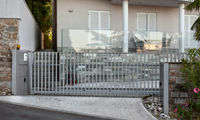

The Door & Hardware Federation has called on the industry to ‘do better’ with regards to training and compliance, following the tragic death of a six-year-old boy who was crushed to death by an automated gate.
The horrific incident took place in an underground carpark on Leylands Road, Leeds, on 31 October 2015, and has resulted in the prosecution, and subsequent fining of, Bradford-based company Bradfabs Limited.
The hearing at Leeds Crown Court heard that the boy was playing with friends on the gate, pushing it open and closed. The gate was pushed beyond the retaining mechanism as no end stop had been fitted to the gate track. The gate fell over, trapping and fatally crushing the child.
Following an investigation by the Health and Safety Executive (HSE), Bradfabs Limited pleaded guilty to breaching Section 3 (1) of the Health and Safety at Work etc Act 1974 and was fined £30,000 and ordered to pay full costs of £12,411.46. HSE determined that the company that had manufactured and installed the electric gate failed to install an end stop, and that no-one else involved in commissioning or maintaining the gate over the next six years noticed and rectified the deficiency.
This tragic accident, and resulting prosecution, follows numerous similar incidents over recent years involving derailments or hinge failures that have led to a gate falling and causing serious injuries or fatality. Common to all these incidents has been the lack of effective travel stops.
DHF is keen to remind all those involved in the supply, installation, maintenance and management of gate systems that all gate systems, regardless of design, must include effective travel stops that will prevent derailment and falling under all foreseeable conditions:
• In normal use,
• When electrical/electronic travel limiting systems suffer a fault, and
• When the gate is being used manually.
“Many people have commented that it seems strange that the original manufacturer has been prosecuted in this case rather than the more common outcome of the maintenance company being prosecuted,” explains DHF’s Senior Training and Compliance Officer, Nick Perkins. “But we would remind all companies involved in manufacture, installation, maintenance and repair of gates, doors and barriers, of the advice given to our industry by HSE following a high-profile prosecution in 2014, resulting from the death of Karolina Golabek in 2010.
“The prime function of identifying the responsibilities of duty holders is not to hold them accountable when things go wrong, but to ensure things don’t go wrong in the first place. Don’t think what do I need to do to avoid prosecution? Rather, what do I need to do to ensure the installation is safe?”
“It must be understood that, in the event of an incident with a system, the ensuing investigation will assess the input and actions of all parties associated and no guarantee of the outcome can be given. The investigation will ask who did what, what did those involved know about the condition of the offending system and then what action could they have reasonably taken, or did they take, to prevent the occurrence?
“Whilst we do not have intimate details from HSE as to why a particular company has in fact been prosecuted in this instance, we remind all concerned that legal responsibilities exist in equal measure for manufacturers, installers, owners, managers, maintainers and repairers. The passage of time does not negate those responsibilities; although recent prosecutions have seemed to place a higher responsibility on the last person on site, this does not mean that there is no liability to anyone with previous involvement.
“The only way that anyone in our industry can remain immune from legal liabilities is to ensure that the systems they manufacture/install are safe and that all existing systems are left in a safe condition following maintenance or repair. Safe and compliant systems do not lead to injury, death or prosecution.”